
Letter From The Executive Director
Dr. Robert M. Panoff
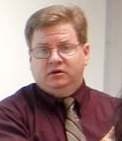
As part of every grant application to the National Science Foundation (NSF), we are required to describe both the intellectual merit of our projects and their broader impact . Because it says so much about what Shodor does and how we do it, this issue of Interactions focuses on how we affect students and teachers in our community, and how we help other efforts across North Carolina, nationally, and even internationally.
Locally, and under our Computing MATTERS program, we are offering more workshops for students and teachers across North Carolina. Workshops at Shodor are described in the articles here, and our professional development team has been busy, too. For the first time we have offered an on-line course in partnership with LearnNC to help North Carolina teachers develop lesson plans using resources from the National Science Digital Library. We hope to offer this course several more times for different grade levels and content areas in math and science.
At the national level, our National Computational Science Institute (NCSI) sponsored and conducted week-long workshops for nearly 200 college faculty and high school teachers this summer. Funding from several NSF grants allowed us to have nine workshops from San Jose to Massachusetts, and several states in between. Four of the workshops were interdisciplinary, with the topic Introduction to Computational Thinking, and others were focused on Computational Chemistry for Chemistry Educators, Computational Biology for Biology Educators, and Parallel and Distributed Computing. At each site, faculty from not only the home institution but also from several different surrounding colleges or schools participated. You can visit www.computationalscience.org/map to see a map of one of the "broadest impact" summers NCSI has ever had.
Internationally, Shodor is now part of two new international partnerships, one focusing on science education and the other on high performance computing across the curriculum. Also Eduteka, our partner in Colombia, has just finished a new design of the Spanish language version of our math and science courseware, Interactivate which will help our work with bi-lingual students and families.
Thanks to all of our supporters and collaborators, the experiences of our dedicated staff and students at Shodor are being shared to achieve this significant broader impact.
All the best,

Bob Panoff
Summer Workshops ReCap
BY Lucy Yin, Shodor Intern
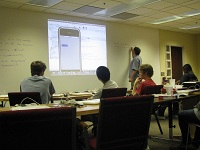
At Shodor, workshops are the most direct way to fulfill the mission of utilizing simulation technologies and computational science in order to revolutionize math and science education. Summer is the perfect time for workshops because students are out of school, leaving them free to participate in one or two effective half-day sessions. This summer kept with tradition as Shodor continued to host several workshops for sixth through twelfth grade students.
The workshops address an array of STEM (Science, Technology, Engineering, and Mathematics) topics and open students eyes to the technologies surrounding them. For example, most of the students attending the Web Design Skills workshop had used personal computers to surf the web daily but were unaware of the way websites are created. Over the course of the five day workshop, students sketched out their ideal website and learned HTML and CSS code in order to bring their vision to life. After learning the basics, "workshoppers" added details and finesse to their website using programs like GIMP, a photo editing program similar to Photoshop. The end result was, in the words of student Edward Clemons, "a killer website".
Shodor of course offers a selection of computer programming workshops. There are introductory level courses like the Programming Concepts workshop; in this workshop students learn how to build a model on the spread of epidemics or an SIR (susceptible, infected, recovered) model using Java. Shodor intern Gavin Borg described the workshop "Students definitely gain a solid understanding of the basic concepts behind Java programming and by the end of the workshop should be able to apply their knowledge to higher order programming".
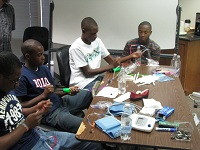
Aside from basic programming courses, more sophisticated workshops are also offered, such as the Introduction to iPhone Development where students learn how to create and debug iPhone applications. The Introduction to Parallel Programming workshop provides students with another view of programming and teaches them about parallelism, or a form of computation where simultaneous calculations are performed across multiple computer processors. Shodor Executive Director Dr. Robert Panoff and Computational Science Mentor Andrew Fitz Gibbon helped students understand the importance of parallelism in the real world during the Parallel Programming workshop. Shodor apprentice and workshop student Yili Wu learned parallelism is necessary in computers because "everything in the real world, nature and the galaxy uses parallel computing".
Although computers are usually the focus of workshops at Shodor, many courses allow students to get hands-on experience with other materials. The Modeling Your World workshop challenges students to use a five-foot rope to simulate or model any object they could think of. This year students made a snake, a tight rope, and even a racetrack. The workshop also teaches students to create computational solutions to popular models such as predator-prey and population growth. In the Engineers in Training workshop students are challenged to build a tower out of straws and pins. Students also make several computational models to help them understand electrical, structural, and biomedical engineering. Shodor intern Luke Van Oort comments that students "benefit from being able to make physical models based on their lecture material".
With six workshops already completed this summer, Shodor is only halfway done. At the time of writing this Graphics and Visualization, Math Explorations, Forensics, another Programming Concepts and Web Design Skills, and the Shodor Scholars Program remain to be taught. Workshops at Shodor are a great way to introduce students to the world of computational science. Many students choose to continue their education with Shodor by becoming apprentices or interns.
Visit our SUCCEED workshop page to learn more about Shodor's workshops.
Shodor Summer Fun
BY Sam Leeman-Munk, Shodor Intern
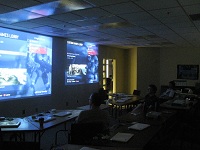
The Shodor Enrichment Committee (SEC) is back for the summer. With an entirely new student committee led by Shodor intern Darian Rieth, the SEC has designed a brand new schedule of activities for the entertainment and education of all at Shodor. Already the SEC has hosted a movie night, a games night, and a surprise ice cream party.
On June 28th, Shodor staff, interns, and apprentices alike recited popular lines along with Shodor Executive Director Dr. Bob Panoff to the movie The Princess Bride. Although few people in the room were seeing it for the first time, the movie did not fail to entertain.
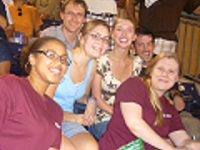
The following week the Shodor crew came together again for a night of video and board games. Staff, interns and apprentices alike enjoyed a variety of games, including Halo 3 for Xbox 360, Super Smash Brothers Brawl and Mario Kart for Nintendo Wii, and Openarena, a port of Quake 3 for PC. A single game of Epic Munchkin, brought by intern Eric Aiello, occupied nearly the entire night for another group of Shodorites.
In coming weeks the SEC has planned a baseball game outing with the local minor league team the Durham Bulls, and a canoeing trip at University Lake in Chapel Hill. In August the SEC will sponsor a trip to the movies as well.
Reith runs the SEC through a democratic process, seeking input from would-be participants and encouraging them to take active part in the planning. "I think it's great that the activities are so diverse," says Rieth, sending out an all-office invitation to a Durham Bulls game, "It allows a lot of people to have fun."
Apprentices such as Neal Ramesh enjoy helping with parts of the SEC planning. "I liked it and had a lot of fun," said Ramesh of the Shodor games night. "My favorite part, though?" added Ramesh, who played Halo 3 with his mentor Shodor staff member Ernest Edinboro, "killing Ernie."
Continued Success with APPLES Partnership
BY Darian Rieth, Shodor Intern
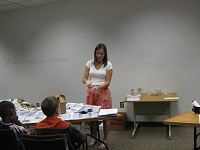
Shodor continued its involvement with UNC-Chapel Hill's APPLES (Assisting People In Planning Learning Experiences In Service) Service Learning Program this summer. APPLES is a student led organization whose main goal is to create connections between students, faculty, and their surrounding communities. This aspiration led APPLES to create both a spring and summer internship program. The APPLES Summer Internship Program is made possible through over 20 local partnerships, like the one APPLES currently maintains with Shodor. Throughout the rest of this article I would like to share my experience as an APPLES intern at Shodor with you.
Alyssa Canty, Shodor's APPLES Spring intern, has continued her involvement with Shodor into the summer. "After completing my required spring hours," Alyssa explained, "I continued to intern at Shodor because I found it to be a great way to be involved in the community through offsite workshops and an experience that will help me as I begin to plan my professional future and goals." Alyssa is one example of a successful partnership with APPLES.
As Alyssa's successor as a Shodor APPLES intern, most of my time has been dedicated to making the summer at Shodor a success: I have organized summer duties for interns and apprentices, helped with SUCCEED workshops, and planned events for the Enrichment Committee. The students and educators we serve have also benefitted from the testing I have done for various Interactivate activities.
APPLES summer interns are required to spend 320 hours at their internship site, Shodor in my instance, over the course of the summer. The time that I have spent at Shodor this summer has been very educational for me. I have gained basic knowledge of HTML and CSS coding and I have been able to get a close look at the ins and outs of a non-profit organization. My experiences teaching the SUCCEED workshops have taught me great preparation and presentation skills. Every minute I have spent at Shodor has had me learning something new, an experience that I find extremely worthwhile.
In addition to the time spent at each organization, every APPLES summer intern is required to complete an independent study course through UNC. I have chosen to relate my studies to my expected major, Business, and have therefore focused my course on the business aspect of non-profits like Shodor. With the help of my academic mentor, I have selected a variety of scholarly articles on topics relating to the success of non-profit organizations. My academic credit is based on my weekly journal entries, a final paper, and an oral presentation.
In the short time that I have been an intern at Shodor, I have seen the benefits of working with such a determined and helpful staff. The dedication Shodor has to its internship and apprenticeship programs is tremendous and I know that mentoring these students will continue to help Shodor in maintaining its claim of transforming learning through computational thinking. APPLES will continue to assist Shodor with such programs by supplying hard-working and motivated students.
Bennett College and Shodor Partner for NSF
BY Hillary Stoker
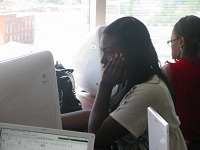
On June 21st 2010, a group of 16 students from Bennett College's National Science Foundation (NSF) Summer Academy participated in a daylong workshop at Shodor, a computational science education non-profit located in downtown Durham.
Bennett College has hosted the NSF Academy since 2007. The NSF Academy program is a 5-week summer experience designed to encourage young women to pursue careers in science, technology, engineering, and mathematics (STEM) fields. During the program, the NSF prepares students to pursue these careers through various hands-on activities such as workshops, field trips, course and lab work, and computational science projects. Students will not only gain a better understanding of computational science, but can also receive up to seven (math and science) college credits upon completion of the program. Any rising high school senior, or incoming Bennett College first year student is eligible for the program.
This year's Academy has 16 student participants and 3 Bennett College student instructors. During their visit to Durham, the Academy students participated in the second of two, daylong workshops facilitated by Shodor. Both workshops were focused around the topic of web design. During the first day workshop (held at Bennett College), students learned the planning processes for developing a personal web page. They received a brief overview of how to compose and structure web content, how to write and test code, and what visual design means. At the end of the first day, each student had created a basic website. The second day workshop (held at Shodor), focused on stylizing the websites the students had created during the previous workshop. They were able to add images, links, and other personal information. According to Shodor instructor Heather Marvin, "I looked around to see several students with brightly-colored backgrounds, several images, personalized content, links to websites they found interesting. It was apparent that they were really applying what they were learning to create something of personal value to them."
Shodor has been a partner of the Academy since the Academy first began in 2007, but has been partnering with Historically Black Colleges and Universities- Undergraduate Program (HBCU- UP) at Bennett College since 2006, providing numerous student and faculty workshops not only during the summer months but also during the academic school year. The partnership between Shodor and the Academy began when Dr. Robert Panoff, Executive Director of Shodor, presented a workshop on system dynamics at Bennett. "Dr. Robert Panoff was the pioneer in introducing us to computational science and has been working with us for several years. Because of his efforts, 'computational science' is no longer a 'new' term on our campus. Faculty have developed courses using the tools of computational science. Simulations and modeling have enlivened our lectures and laboratories and have added more excitement to learning and teaching," says Dr. Margaret Curtis, Executive Director of NSF's HBCU Undergraduate Program at Bennett College. "We hope that the students will begin to see the benefits of this interdisciplinary science and that they will come to understand how it will touch the lives of virtually every science professional," says Dr. Curtis.
Shodor is pleased to be able to provide these workshops to university students and faculty and is looking forward to continuing its relationship with Bennett College well into the future.
Shodor Partners with HiPOP
BY Vadim Khazan, Shodor Intern
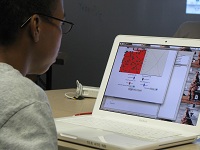
High performance computing (HPC) is the rapidly expanding field that deals with utilizing computer clusters and supercomputers to solve extensive computational problems. Physicists, mathematicians, business analysts, and many others are already utilizing HPC in their research. As the complexity of scientific problems increases, HPC will become a progressively more integral part of industry and academia.
Recognizing the lack of awareness about the importance of HPC to modern society, the HiPOP project launched its initiative to "address the critical shortage of human resources with adequate skills in the rapidly developing fields of High Performance Computing (HPC) and Computational Science and Technology (CS&T)." Based in Cyprus, HiPOP (High Performance Computing Opportunities) has teamed up with Shodor and an international consortium of institutions that are focused on promoting HPC through various educational and outreach programs.
HiPOP and its partners aim to develop joint educational policies and design a suitable web platform to expose HPC opportunities. The implementation of this web platform will mainly be carried out by the Cyprus Institute, with support from the University of Illinois and Shodor. It will be up to all of HiPOP's partners, as well as students from around the world, to evaluate the efficacy of the developed policies and the implemented cyberplatform.
Generating Enthusiasm for Scientific Exploration
BY Terri McClain, Washington University in St. Louis
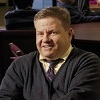
Physicist Robert Panoff wants to build better scientists. In the mid-1990s, he founded the Shodor Education Foundation, a nonprofit research and education organization, to improve the way math and science are taught. To that end, the foundation employs computer methods that prove to generate greater enthusiasm for scientific exploration among young people.
Panoff explains that Shodor's operation allows all to do fun science, not just those students left after a typical undergraduate weeding-out process. "We use fun science to get students to want to do the hard work that is before them," Panoff says. "We can give kids the power to change the world in a computer model, instead of making them wait until graduate school to do experiments. So in the jargon of the educationalists, we're using computer simulations and visualizations as a pump instead of a filter."
Computation is, of course, a fundamental aspect of science. Physics, in particular, requires lengthy calculations that could take years to complete without the use of computers. As a computational physicist, Panoff is adept at using simulation models to study scientific problems.
"Rapid computation doesn't have any purpose if you don't have any reason to believe the calculations that are done," he says. "So a lot of what we do is under the guise of verification and validation." Panoff stresses that Shodor not only teaches those two things at the research level, but also at the college, high school and middle-school level. "Verification comes if you solve the problem correctly," he says. "Validation is a test of whether you solved the correct problem."
As it turns out, these concepts are not difficult to teach children. With computer simulations, kids easily observe change and effect. "For lack of a better word," Panoff says, "we give them control knobs and say, 'Okay, now make this change and see if you can observe any effect. What does that tell you about what we're changing and how you study this? How sure are you that it's right?' We give them the sense of how scientists study things through very careful observations."
Overall, the process helps them capture the phenomena and understand what's interesting to study, rather than come up with the big theory. "So we're getting more students at every level excited about being scientists," he says, "because the kinds of things that they can study are just so cool and interesting when we can make them accessible and visual."
Panoff's college notebooks demonstrate an early interest in teaching. On the right side, he wrote class notes - on the left, analytical critiques of the instructor's teaching methods.
While a graduate student at Washington University, Panoff, MA '79, PhD '85, encountered researchers who were pioneering the use of computers in comparative computation. He worked with extraordinary faculty mentors, such as his adviser John Clark, PhD, the Wayman Crow Professor of Physics, and Carl Bender, PhD, the Wilfred R. and Ann Lee Konneker Distinguished Professor of Physics, both in Arts & Sciences.
"These men were really looking at using the mathematical descriptions of physics and the beginnings of computer simulations to obtain a deeper insight into the world." At the same time, Panoff says, Washington University instilled in him a passion for learning and teaching. "I think my Washington U. education clearly shaped a lot of what I do, both in terms of content and method," he says. "There were mentoring and discussions on how to be a teacher, with faculty who cared about the quality of teaching."
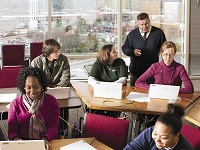
Moreover, his adviser, John Clark, treated graduate students as colleagues and co-authors. Panoff says that as the work was done, it was published. And when it was published, contributing students were co-authors, not just an acknowledgment.
"By the time I wrote my thesis, my research already had been published," Panoff says, "and being a published author before you've even finished your degree really changes your career track."
In the early 1990s, Panoff transitioned from faculty positions in physics to supercomputing projects. On the first project, at the state level in North Carolina, he created a training program designed to teach college faculty how to use supercomputing resources in their research and teaching. He then transitioned to the National Center for Supercomputing Applications at the University of Illinois at Urbana-Champaign, where he continues to serve as a consultant for the education program.
In 1994, after being diagnosed with kidney cancer and given only six months to live, Panoff returned to North Carolina to found Shodor.
He survived the cancer, and he stayed determined to spend his time doing what was most important to him - putting his philosophies into action by mentoring quality science teachers and budding young scientists.
"So what we do now at Shodor," he says, "is focus on developing the best teacher we can develop, the best kid we can develop, and the best teaching materials that a teacher can use with those kids."
Shodor's impact continues to rise. Its "Computational Science Education Reference Desk" website, shodor.org/refdesk/, received an "Official Honoree" designation in the Education category from the 2007 Webby Awards. Among other institutions receiving the designation were Harvard Business School and the Smithsonian Center for Education and Museum Studies. Shodor's "Interactivate" website, shodor.org/interactivate/, received an "Official Honoree" designation in the Science category that same year, sharing the honor with such organizations as the National Oceanic and Atmospheric Administration and Scientific American.
The websites include numerous online tools and resources, aligned to national standards, which parents and teachers can use to supplement math and science education. Some of the activities are games, but all provide opportunities for exploration. Shodor, which is partly funded by National Science Foundation grants, even offers video lessons in American Sign Language.
With a small staff of experts in education, science, mathematics and computer programming; 25 to 30 college interns; and 40 to 50 high school students in various levels of "apprenticeship," Shodor provides classes to hundreds of kids each year. The interns and apprentices provide invaluable assistance with teaching; in fact, they build many of the organization's interactive educational tools.
As a result, Shodor greatly impacts community-based learning by training young people who are looking to make a difference. "Service learning is becoming an accepted methodology for preparing young people at the university level to be of use to society," Panoff says.
Shodor takes college and some high school students and gives them the tools, with curriculum and pedagogy and mentoring, so that they can run after-school programs for kids in the public schools. "We're preparing this group of kids who themselves go out and teach other kids. It's through that multiplying effect that what we're doing is really starting to have an impact," Panoff says.
"The phrase I like to use is adept, adapt, adopt," he continues. "We help people who want to do this to become adept, to become very good at doing it. They can adapt our materials to their own interest and skill level, and then they can choose to adopt those things for their own program. Part of our goal is to seed the activities of teachers and future scientists with this type of approach." The ultimate goal? "To transform learning through computational thinking. And that means transforming teachers into more effective, dynamic explorers," he says.
Original article may be found at the Washington University in St. Louis Magazine.
Where Are They Now? Cory Efland
BY Hillary Stoker
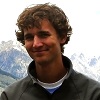
Shodor recently caught up with Cory Efland, a former Shodor intern from 2004, while conducting a professional development workshop for Carteret County (North Carolina) teachers. After a few pleasantries, contact information was exchanged... This story is what has come out of that contact; it is great to see a Shodor alumni doing so well!
Cory Efland, now 23, originally came to Shodor as a high school senior. While at Shodor Cory worked in system administration, helping staff with system maintenance or troubleshooting tasks. "I enjoyed my work as a sys admin at Shodor and have had several other jobs involving sys admin work since then," states Cory.
Since leaving Shodor, Cory graduated from Appalachian State University with Bachelor's of Science degrees in Technology Education and Industry Education with a concentration in Graphic Arts. After graduation Cory pursued a career in education and is currently teaching Project Lead The Way classes in Carteret County NC. According to Cory, "Shodor was one of my first experiences where I was able to see the direct impact that Math and Science enrichment activities have on students".
Although this is his first year teaching in Carteret County, Cory thoroughly enjoys his work and is looking forward to continuing Project Lead The Way in the following years. "One of the things I most enjoy about teaching is the connections I can make with students. I have had students who come and visit me everyday, even when they do not have me for a class. This says a lot to me, and it is a big help when other things may not seem to be going well," says Cory.
In addition to working with Project Lead The Way, Cory enjoys personal hobbies such as photography and graphics design.
Together in Education

Together in Education is Harris Teeter's fundraising program for community schools. When Harris Teeter customers purchase groceries using their VIC card Shodor will receive a percentage of those purchase dollars. Visit http://www.harristeeter.com/community/together_in_education/tie_details.aspx to link your VIC card and contribute to Shodor! Shodor's school code is 5588.